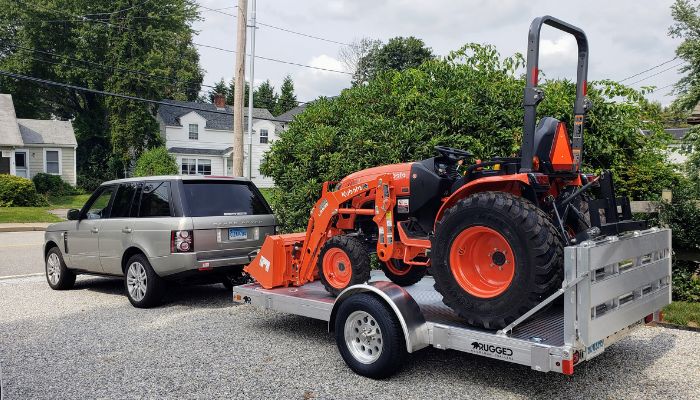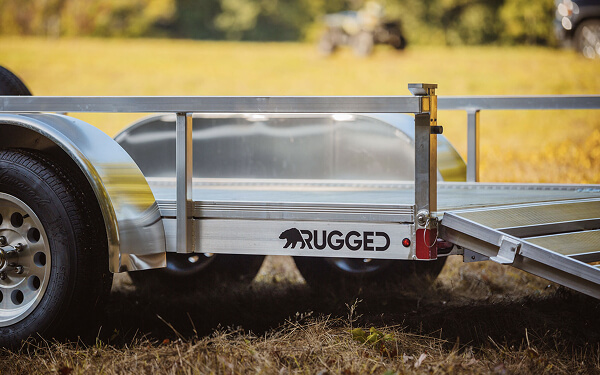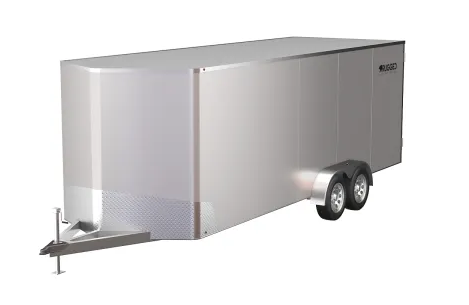What Size Trailer Do I Need for My Vehicle and Load?
One of the most common questions people ask before buying a trailer is: what size aluminum trailer do I need for my vehicle and load? Getting that right makes all the difference. The right trailer size helps you tow safely, maximize payload, and keep your vehicle performing efficiently for years.
At Rugged Aluminum Trailers, we build every lightweight aluminum trailer to match real-world towing needs—from compact SUVs hauling weekend gear to full-size trucks pulling equipment cross-country. Here’s how to pick the right size and setup for your vehicle, plus how aluminum construction gives you more capacity and flexibility than steel ever could.
Understanding Trailer Size, GVWR, Payload, and GAWR
When people talk about trailer “size,” they usually mean deck dimensions—like 5×8, 6×12, or 6.5×16. But what really determines what you can haul safely is capacity. Three key specs matter most:
- GVWR (Gross Vehicle Weight Rating): The maximum total weight of the trailer and its cargo combined.
- Payload Capacity: How much you can actually load onto the trailer once you subtract the trailer’s own empty weight.
- GAWR (Gross Axle Weight Rating): The maximum weight each axle can safely carry. Tandem-axle trailers split the total weight evenly across two axles.
Understanding these ratings—and comparing them to your vehicle’s towing capacity chart—helps ensure your trailer stays well within safe limits. Because aluminum trailers are significantly lighter, you’ll often have more payload capacity available than you would with steel.
Match Trailer Size to Your Vehicle Type
Your tow vehicle determines how much trailer you can safely handle. One of the biggest advantages of a Rugged Aluminum Trailer is that its lightweight design allows a wider range of vehicles—including smaller SUVs—to tow more trailer without being overloaded.
| Vehicle Type | Recommended Trailer Sizes | Typical Uses |
|---|---|---|
| Compact & Mid-Size SUVs / Cars (RAV4, Outback, Highlander, CR-V, Explorer) | 5×8, 5×10, 6×10, 6×12 | Yard projects, camping gear, small ATVs, snowblowers, tools |
| Large SUVs (Chevy Tahoe, Ford Expedition, Toyota Sequoia, Jeep Wagoneer) | 6×12, 6×14, 6.5×14, 6.5×16 | Powersports, lawn equipment, household projects, small vehicles |
| Half-Ton Pickups (F-150, Silverado 1500, Ram 1500, Tundra) | 6.5×14, 6.5×16, 6.5×18 Tandem Axle, 6.5×18 or 6.5×20 Tilt | Motorcycles, side-by-sides, materials, light construction equipment |
| Three-Quarter Ton Pickups (F-250, Silverado 2500, Ram 2500) | 6.5×18 Tandem Axle, 6.5×20 Tilt, Deckover | Larger machinery, multiple ATVs, commercial or contractor use |
Why Aluminum Expands What You Can Tow
The advantage of aluminum is simple: less weight, more capability.
A Rugged Aluminum Trailer typically weighs 30–40% less than a comparable steel model, giving you more usable payload without exceeding your tow rating. That means you can haul the same load—or even more—with a smaller vehicle.
For example, a mid-size SUV or crossover that might struggle with a steel trailer can comfortably tow one of our 5×10 or 6×12 single-axle aluminum trailers while leaving plenty of room for cargo. Larger SUVs like the Tahoe or Expedition easily handle our 6.5×14, 6.5×16, and even 6.5×18 tandem-axle trailers, offering truck-level hauling capability with everyday drivability.
Half-ton pickups take that one step further. A 7,000 GVWR tandem-axle aluminum trailer in the 6.5×16 to 6.5×20 range lets you move serious weight—UTVs, motorcycles, or construction materials—while keeping the setup light enough for efficient highway towing. And since aluminum doesn’t rust, you get long-term reliability with zero upkeep.
The Rugged Aluminum Trailer Lineup
5′ Series – Compact and Easy to Tow
- 5×8 Single Axle: Ideal for light-duty hauling, yard work, or smaller gear.
- 5×10 Single Axle: A little extra space for flexibility while staying compact and maneuverable.
6′ Series – Everyday Utility and Versatility
- 6×10 Single Axle: The perfect balance of space and weight.
- 6×12 Single Axle: Great for homeowners and small contractors who need more deck room.
- 6×14 Single Axle: Longer deck for larger cargo without needing a truck upgrade.
6.5′ + Series – The Workhorse Line
- 6.5×12 Single or Tandem Axle: Popular with landscapers and general contractors.
- 6.5×14 Tandem Axle: Stable, versatile, and built to handle day-to-day use.
- 6.5×16 Tandem Axle: A reliable option for heavier materials or equipment.
- 6.5×18 and 6.5×20 Tilt: Full-size hauling made simple—no ramps required.
- 8×20 Deckover: Maximum width and clearance for commercial gear or vehicles.
The Bottom Line
So, what size aluminum trailer do you need for your vehicle and load?
If you’re towing with a compact or mid-size SUV, start with a 5×10 or 6×12 single axle—light, easy to maneuver, and strong enough for most everyday jobs. If you have a large SUV or half-ton pickup, you’ll comfortably tow 6.5×14 to 6.5×18 tandem axle models or step up to a 8×20 tilt or deckover for full-size performance.
No matter what you drive, Rugged Aluminum Trailers give you more capability out of the same vehicle—lighter weight, higher payload efficiency, and proven stability at highway speeds.
Explore our full lineup using the Rugged Build & Price Tool to design your ideal trailer, see pricing instantly, and have it delivered directly to your driveway anywhere in the U.S.


